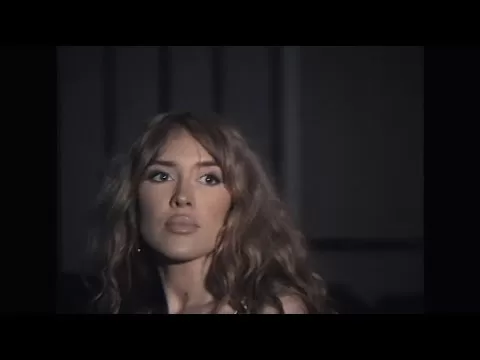After finishing in fourth place on “American Idol” in 2019, the smoky-voiced country singer from small-town Texas promptly moved to Nashville to pursue a record deal — then landed one just months later when she signed with Big Machine, the label known for having introduced music’s biggest star to the world.
“I was hoping I’d get a song on the radio,” she says of her ambitions at the time, “and I’d become the next Taylor Swift.”
That’s not the way it worked out.
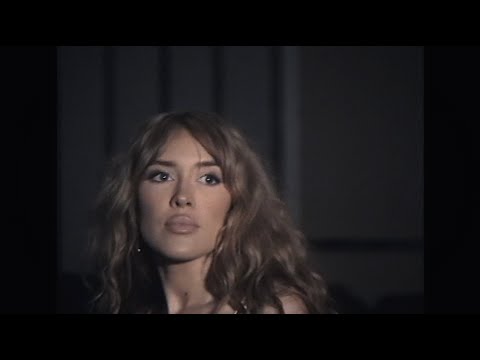
Booth’s arrangement with Big Machine, she says today, turned out to be “one of those nightmare record deals where they just choose everything for you.” The label, according to Booth, told her what to sing and how to dress; she made a somewhat generic eight-track mini-album in 2021 that “didn’t even feel like me,” she says. Though it featured input by proven Nashville hitmakers including Dann Huff, Nathan Chapman and Lady A’s Charles Kelley, the self-titled record sank without much of a trace, and the next year Booth was dropped by Big Machine.
“My manager at the time called me and told me she was coming over, and I knew before she even walked in,” the singer says. “I just had that intuition.”
Now Booth, 28, is having a second go with “The Loneliest Girl in the World,” a striking LP released last week by Geffen Records on which she takes up a darker, deeper sound and a more personal storytelling approach. Positioned somewhere between Megan Moroney and Lana Del Rey, the music finally captures “my true self,” Booth says, “and what I really want to say and do creatively.” It’s also primed for discovery at a moment when country music is more open to new fans — and new voices — than it’s been in years.
The album opens (after a spooky instrumental intro) with the sly but haunting “Cigarettes,” which digs into a pair of formative episodes in Booth’s life: leaving home as a teenager to be with a guy against her mom’s wishes — “I was all of 17, going bad-boy crazy,” she sings over a gently throbbing guitar riff — and encountering the harsh realities of the music business after her stint on “American Idol.”
“Had to watch my dream fall through / I gave myself a day or two,” she sings, “The same Champagne that they bought me / I popped it when they dropped me.”
That really happened, Booth notes with a laugh during a visit to Los Angeles ahead of last month’s Stagecoach festival. Big Machine gave her a bottle of bubbly when she signed her deal, which she held off on opening “because I wanted to wait until a moment to celebrate,” she says. And getting dropped seemed to qualify? “I felt like a failure, yeah, but it was kind of a celebration of a new chapter — like, I don’t have to be this person anymore.” She smiles.
“I poured it on ice because it had been sitting on my counter forever.”
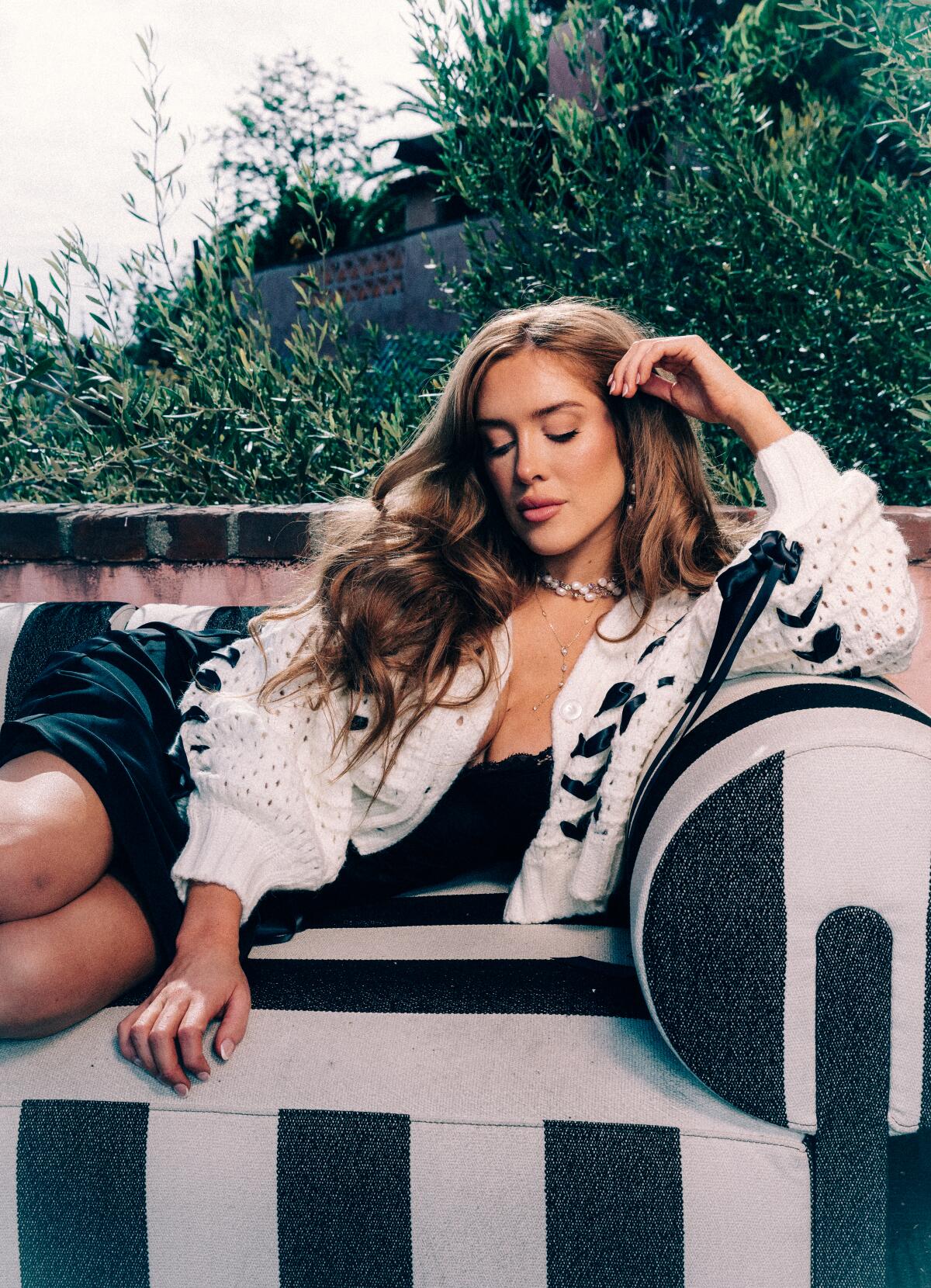
Laci Kaye Booth’s new album positions her somewhere between Megan Moroney and Lana Del Rey.
(Ethan Benavidez / For The Times)
The most impressive LP from a new(-ish) country act so far this year, “The Loneliest Girl in the World” teems with vivid songwriting: the sly wordplay in the sultry “Neon & Off,” about a couple flirting at last call; the portrait of self-destruction in “Nightmare”; the heartbreaking image in “Cigarettes” of Booth’s mother playing “Jesus, Take the Wheel” every day until her daughter returned home.
For the title track, which Booth wrote fresh from the demise of a five-year relationship, she wanted to toy with the expectations established by such a miserable framing. “I didn’t want it to be too serious,” she says, curled on a sofa at a friend’s place near the Hollywood Bowl. “When you’re going through that — being by yourself for the first time in forever — you can either sit in your sadness or you can make it sexy and fun.” Instead of a forlorn ballad, the tune is a funky, low-slung bop; instead of lamenting lost love, she’s identifying the benefits of singledom: “Her friends, they’re having babies / But there ain’t no car seats in her Mercedes.”
Throughout the album, Booth’s singing — her slight rasp and her behind-the-beat phrasing — draws you into the music’s rich emotion, as though she’s imparting a closely held secret.
Says Peytan Porter, a fellow Nashville up-and-comer who befriended Booth a few years ago at the annual Key West Songwriters Festival: “Laci’s first record almost felt like talking to someone who thought they knew her. This one is like sitting with her in her living room.”
Booth grew up in Livingston, Texas, about an hour’s drive from Houston, and started singing as a contestant in kiddie talent shows. (You can see some old stage footage in the video for “Cigarettes.”) This was the early 2000s, which meant that naturally her first vocal hero was Britney Spears. “I’d try to do that nasally Britney thing, but my mom couldn’t stand it,” Booth says, “so she laid me down on the floor and put books on my stomach and made me start using my diaphragm more.” Her mother’s favorite vocalists were country powerhouses like Martina McBride and Carrie Underwood, and for a while Laci tried to emulate their lunging theatrics.
Then she went to a relative’s wedding where the bride and groom handed out copies of a homemade mix CD that featured Norah Jones’ song “Lonestar.” “I thought it was just the most soothing, magical voice I’d ever heard,” Booth says. “Until then I didn’t know that was a thing you could do.” Stevie Nicks singing Fleetwood Mac’s “Gypsy” was another revelation. “I heard it on the radio and was like, ‘Who is this? Please take me to Walmart right now and buy me her CD.’”
Eventually she started performing in restaurants on the weekends — three- or four-hour shifts in which she’d play “every cover you could imagine” — while she was in college studying to become a physician’s assistant. In late 2018 she tried out for Season 17 of “Idol,” an audition still seared into her memory: “Right before I went on, a producer asked me my name, and I went completely blank — I couldn’t answer him.” She laughs. “I was just a nervous girl with a really bad spray tan.”
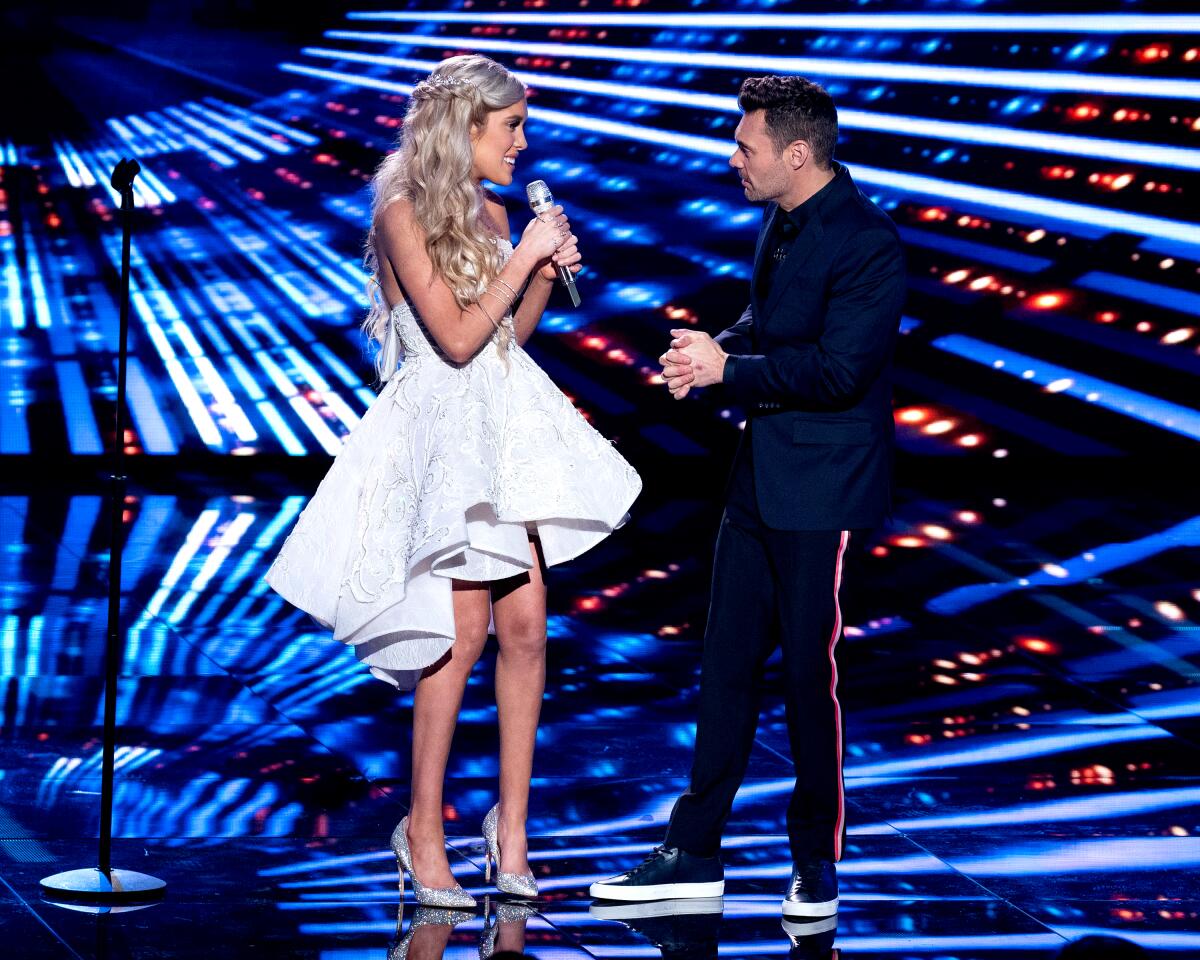
Laci Kaye Booth and Ryan Seacrest on “American Idol” in 2019.
(Eric McCandless / Disney / Getty Images)
Nevertheless, Booth made it through week after week on the singing show until she was eliminated five years ago this month; by the end of 2019, she was sitting with executives from Big Machine, which she says was the first label she met with in Nashville. “I was so green, but I was so excited that I was in front of these people who’d signed Taylor Swift and made her — well, she made herself a huge star,” Booth says. “They said on the spot they wanted to sign me, so I didn’t really give myself a chance to explore anywhere else.”
She joined Big Machine in the wake of the label’s acquisition by Scooter Braun, which had drawn fierce criticism from Swift (who said the sale put her music in the hands of a bully) and which inspired the pop megastar’s wildly successful campaign to re-record her early albums. “I remember asking around — like, ‘What is this about? Are these good people that I’m signing with?’” Booth says. “Let’s just say that everybody around me wanted me to sign that deal. I heard only the best things about Big Machine.”
Yet tensions quickly developed while she worked on her debut for the label. “I didn’t have a lot of creative control,” she says. “It was just me sitting on a Zoom with people telling me what songs I was gonna cut.” She described the style she had in mind as “dreamy country” but was told not to use that phrase “because it sounded too sleepy,” she says.
Also: “Because my mom is Hispanic and I have a little bit of Mexican in me, there were talks of doing this Latino country thing” among execs at Big Machine, which recently changed its name to Nashville Harbor Records & Entertainment. “And I was just not on board because I felt like I was taking a spot — I mean, look at me — that somebody else could very much take.” One tune from the mini-album with a vaguely Latin flair, “Treasure,” now “kind of makes my skin crawl,” Booth says.
In a statement, Nashville Harbor Chief Executive Jimmy Harnen pointed out that Booth co-wrote all eight tracks on “Laci Kaye Booth” and said that each had been “mutually agreed upon” by the singer and the label. “Along with being her label head and executive producer, I was and remain one of her biggest fans,” Harnen continued. “There was no one outside of Laci who wanted her to be more successful than I did. It’s unfortunate that sometimes great songs aren’t hit records and things didn’t turn out the way we all had hoped.”
Asked why in her view the music she recorded for Big Machine didn’t take off, Booth says, “A lot of different circumstances. It was COVID. It was 2020. There was really nobody that was popping off besides Lainey Wilson, and she was working her ass off.” Mostly, though, she thinks it was because “I didn’t believe in it, and people can feel that.”

Does she look back with resentment at the folks who helped usher her toward such a disappointing creative product? “I’ve removed all those people from my life because of that reason,” she says. (After the split from Big Machine, Booth changed managers and booking agents.) “I’m more angry at myself for not knowing how to say no — for feeling like ‘no’ is a really rude word.”
Booth went through “all the stages of grief” after being dropped, she says; she considered moving home to Texas or maybe finishing the college degree she abandoned to do “Idol.” But she also kept writing songs, one of which — a delicate, old-timey ballad called “True Love” — found its way to a producer, Ben West, with whom she’d worked a few times.
“I just about fell out of my chair,” West says today. “I was blown away by how good the writing was.”
Booth told him she had no deal and no money; she’d taken out a loan to pay her rent and had started shopping at Ross Dress for Less. “Actually, I still shop at Ross,” she clarifies with a laugh. West said they could worry about money later. “This was a real chance to hit the reset button on who she is as an artist,” he says.
Together they shaped a lush yet spacious sound with echoes of Skeeter Davis and Fleetwood Mac. Having already experienced more record-label meddling than she’d have liked — and figuring that many execs would look at her as damaged goods anyway — Booth kept her new songs largely to herself until she and West were almost finished with them. In late 2022 she released “Damn Good in a Dive Bar” with a lo-fi music video in a clear post-Del Rey mode. (Yes, Booth watched the livestream of Del Rey’s Coachella performance last month: “I had chills all over my body. Hottest thing I’ve ever seen.”)
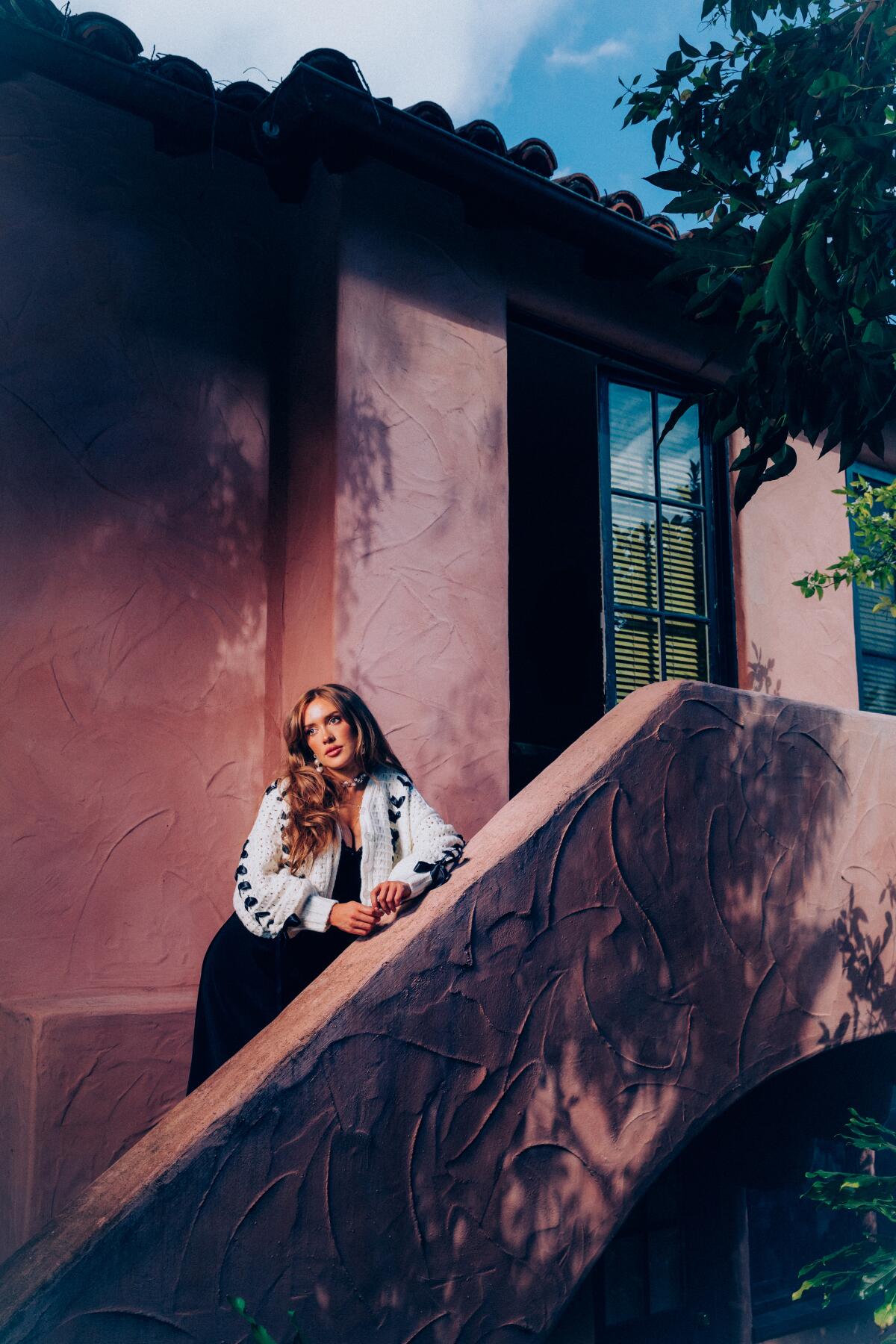
Laci Kaye Booth now has a deal with Geffen.
(Ethan Benavidez / For The Times)
Matt Morris, senior vice president of A&R at Interscope Geffen A&M, came across Booth singing “Damn Good in a Dive Bar” on TikTok; the quality of the music she sent him after he reached out caught him off-guard. “It’s very rare that you see something you like on that app and then the artist is like, ‘I have a ton of music that’s fully written and fully produced,’” says Morris, who earlier signed Olivia Rodrigo. “She had an entire body of work.”
Booth, whose deal with L.A.-based Geffen (as opposed to a Nashville company) reflects the growing interest in country music among the coastal major labels, admits it’s been tough in some ways to restart her career. Many of her pals in Nashville — including Porter and Tiera Kennedy, who recently appeared on Beyoncé’s “Cowboy Carter” — have made their debuts at the Grand Ole Opry, for instance, while Booth is still waiting to make hers. At Stagecoach, meanwhile, she performed not on one of the festival’s official stages but as part of an entry-level brand activation for a brewery.
Yet she also has more of a sense of perspective than she did the last time she put a record out. “I’ve learned from the mistake of not speaking up for myself,” she says. “I’m very vocal now about what I like and what I don’t like.”
Says her friend Porter: “Laci could’ve gotten really bitter but she’s too much of a bad bitch to let this industry jade her.”
If “Loneliest Girl” becomes a hit, would she take any satisfaction in having proven wrong those who once doubted her? Her wide eyes narrow into an are-you-kidding-me? expression.
“Absolutely,” she says. “Absolutely!”
